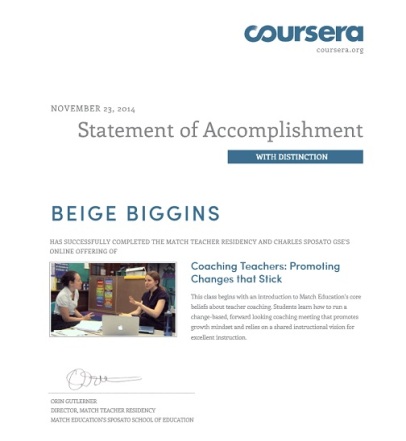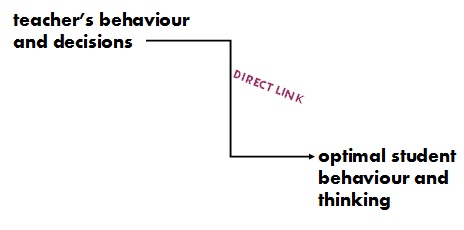Wow, what a sense of accomplishment I am feeling from completing my first mooc. I was getting nervous when I found out there was a final exam that included viewing a video of an actual coaching session then critiquing the effectiveness of the coach. I am so glad I “stuck” with it, haha get it changes that stick and I stuck with it, anyway It was definitely harder than I had anticipated but feeling good about my 90.8% for a final grade.
Learning in a mooc has been both interesting and challenging and I’d like to take some blog space to reflect upon my experience. For those of you in the dark about moocs take some time to check it out, you just might find yourself joining one!
MOOC=MASSIVE OPEN ONLINE COURSE
Digital Project Reflection
When I first began to think about my digital project back in September I was not sure what exactly to expect. I decided on option c which was to join and share my learning in a mooc. I started my search for a mooc that would be beneficial to my learning and career and ended up on the Coursera web-site. On the site I came across one that seemed to be perfect for me as I move forward in my teaching career. I chose “Coaching Teachers: Promoting Changes That Stick”. I registered and I was on my way. This was really my first mooc experience as I had joined a mooc earlier in the year but never fully completed all the requirements and it just sort of fizzled out for me so now was my time to see what a mooc was all about.
I started the introductory week and was immediately struck by one, how many other people were also enrolled in the mooc, and two, the distances they were enrolled from. I was in this experience with educators from all over the world. This experience was already connecting me beyond how I’ve ever worked before. So, I started with my introduction in the discussion areas and read and posted on other introductions. The first week ended with a welcome video and introduction of what was to come. The expectation was to every week watch the lecture videos, read the included text documents, complete a mandatory quiz, and make at least two posts on the discussion boards. I could compare it to the expected weekly work in my ETAD classes. I was feeling optimistic.
Week one of content went pretty good. I watched the videos, did the readings, and completed my quiz in three tries. By the way, you are expected to do the quiz and get 100%, good thing they gave me five tries! To check out the content I covered in week one see my blog post “My effective coaching project is underway!“. It was going well with content, the trouble came when it came to the discussion boards. I clicked on the link and was completely overwhelmed with posts. With so many participants the discussion boards were flooded, where would I start? I had to walk away and come back with a plan. I decided I could not go through all the posts looking to comment so I made myself a goal. Every week at a minimum I would create one thread myself and respond to one other person’s thread. This seemed to work for me and I was able to get into using the massive discussion boards. As a side note, as the course progressed I was able to do more on the boards for a few reasons. One reason was as the boards became less flooded possibly as people fizzled out of the mooc and another reason was I made some connections to other educators and was able to follow their threads better.
Week two content was my favourite as it was all based around the concept of mindset. See what was covered by reading my blog post “The Four Horsemen of the what????“. I continued my posting plan on the discussion boards and I felt I was learning. I also got the chance to participate in one of the open office hours sessions as it fell in a time frame that worked here in Saskatchewan.
Week three and week four of content was the same. I had no trouble going through the lecture videos, doing the readings and completing the quizzes. I was down to one try on the quizzes so feeling a bit proud of myself. My week three blog post was “If life is a game, shouldn’t we be in the same team?” and week four “Feedback, who needs it?” reflected on my learning so far. I was really starting to feel like I was putting ideas together and building a good coaching framework. So I was so excited when in week four I got the opportunity through my school to put some teacher coaching practice into use. I was asked to work one on one with a few new teachers to improve their understanding and use of differentiation skills in the classroom. I was ecstatic to get to plan and meet with these teachers using the Changes That Stick framework I had been studying. The coaching sessions were relatively successful even though I of course couldn’t use all aspects as the sessions were in a shorter time frame than a typical coaching situation. I still feel I got to practice what I had learned in a real world situation.
The final assessment was next and a very interesting way to end the mooc. I was apprehensive as I always am with assessment but excited to see if I had learned what was expected of me. Basically I was interested to see if my learning in the mooc worked as it was intended by the presenters and designers. Seeing as I had taken this for my EC&I 831 course originally to explore actual learning within a mooc I wanted to know if the learning environment of a mooc was successful for me. The first step of the assessment process was I watched the video, completed the report, and submitted it. Now the interesting part started. The evaluation was done by peers. So, basically every person who completed the assessment received three other people’s assessments and had to evaluate the answers using a provided rubric. Step two was to evaluate three peer assessments and submit that. The final step was to self evaluate your own assessment using the rubric and submit that and whew I was done and playing the waiting game for results!
Well as you can see from above mooc complete!
Learning in a Mooc
In this particular mooc I feel there are things that could have been presented differently to better meet learning styles. For example the same lecture/reading format every week would turn some learners off because although the content was interesting, the delivery was a bit old school even though it was online. Also I would have like to see some variety in the quizzes, not just multiple choice format. I also would have really liked to see more face to face contact opportunities for example using Blackboard Collaborate software so I could hear and discuss with others.
I did appreciate the ability to connect with other educators through the discussion boards. The content was well planned and organized for the learners. I gained some useful resources and templates.
I found learning in this mooc to be worthwhile. I gained skills and knowledge that I feel will be very useful to me in my career without leaving the comfort of my own home. Moocs open up a world of opportunity for learning. If you have the opportunity I recommend doing it, take a mooc. I know this was my first but won’t be my last.
When I reflect upon the mooc I took as well as the reading I have done on moocs and their effectiveness I have come cross many opinions, research, and information. I am left with these questions and want to know what you think;


